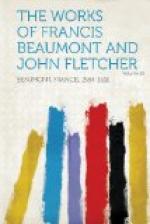veine
Is ruin’d to survive in thee againe;
Such in his time was he of the same peece,
The smooth, even naturall Wit, and Love of Greece.
Those few sententious fragments shew more worth,
Then all the Poets Athens ere brought forth;
And I am sorry we have lost those houres
On them, whose quicknesse comes far short of ours,
And dwell not more on thee, whose every Page
May be a patterne for their Scene and Stage.
I will not yeeld thy Workes so meane a Prayse;
More pure, more chaste, more sainted then are Playes,
Nor with that dull supinenesse to be read,
To passe a fire, or laugh an houre in bed.
How doe the Muses suffer every where,
Taken in such mouthes censure, in such eares,
That twixt a whiffe, a Line or two rehearse,
And with their Rheume together spaule a Verse?
This all a Poems leisure after Play,
Drinke or Tabacco, it may keep the Day.
Whilst even their very idlenesse they thinke
Is lost in these, that lose their time in drinkt.
Pity then dull we, we that better know,
Will a more serious houre on thee bestow,
Why should not Beaumont in the Morning please,
As well as Plautus, Aristophanes?
Who if my Pen may as my thoughts be free,
Were scurrill Wits and Buffons both to Thee;
Yet these our Learned of severest brow
Will deigne to looke on, and to note them too,
That will defie our owne, tis English stuffe,
And th’ Author is not rotten long enough.
Alas what flegme are they, compared to thee,
In thy Philaster, and Maids-Tragedy?
Where’s such an humour as thy Bessus? pray
Let them put all their Thrasoes in one Play,
He shall out-bid them; their conceit was poore,
All in a Circle of a Bawd or Whore;
A cozning dance, take the foole away,
And not a good jest extant in a Play.
Yet these are Wits, because they’r old, and now
Being Greeke and Latine, they are Learning too:
But those their owne Times were content t’ allow
A thirsty fame, and thine is lowest now.
But thou shalt live, and when thy Name is growne
Six Ages older, shall be better knowne,
When th’ art of Chaucers standing in the Tombe,
Thou shalt not share, but take up all his roome.
Is ruin’d to survive in thee againe;
Such in his time was he of the same peece,
The smooth, even naturall Wit, and Love of Greece.
Those few sententious fragments shew more worth,
Then all the Poets Athens ere brought forth;
And I am sorry we have lost those houres
On them, whose quicknesse comes far short of ours,
And dwell not more on thee, whose every Page
May be a patterne for their Scene and Stage.
I will not yeeld thy Workes so meane a Prayse;
More pure, more chaste, more sainted then are Playes,
Nor with that dull supinenesse to be read,
To passe a fire, or laugh an houre in bed.
How doe the Muses suffer every where,
Taken in such mouthes censure, in such eares,
That twixt a whiffe, a Line or two rehearse,
And with their Rheume together spaule a Verse?
This all a Poems leisure after Play,
Drinke or Tabacco, it may keep the Day.
Whilst even their very idlenesse they thinke
Is lost in these, that lose their time in drinkt.
Pity then dull we, we that better know,
Will a more serious houre on thee bestow,
Why should not Beaumont in the Morning please,
As well as Plautus, Aristophanes?
Who if my Pen may as my thoughts be free,
Were scurrill Wits and Buffons both to Thee;
Yet these our Learned of severest brow
Will deigne to looke on, and to note them too,
That will defie our owne, tis English stuffe,
And th’ Author is not rotten long enough.
Alas what flegme are they, compared to thee,
In thy Philaster, and Maids-Tragedy?
Where’s such an humour as thy Bessus? pray
Let them put all their Thrasoes in one Play,
He shall out-bid them; their conceit was poore,
All in a Circle of a Bawd or Whore;
A cozning dance, take the foole away,
And not a good jest extant in a Play.
Yet these are Wits, because they’r old, and now
Being Greeke and Latine, they are Learning too:
But those their owne Times were content t’ allow
A thirsty fame, and thine is lowest now.
But thou shalt live, and when thy Name is growne
Six Ages older, shall be better knowne,
When th’ art of Chaucers standing in the Tombe,
Thou shalt not share, but take up all his roome.
Joh. Earle.
UPON Mr FLETCHERS
Incomparable Playes.
The Poet lives; wonder not how or why Fletcher revives, but that he er’e could dye: Safe Mirth, full Language, flow in ev’ry Page, At once he doth both heighten and aswage; All Innocence and Wit, pleasant and cleare, Nor Church nor Lawes were ever Libel’d here; But faire deductions drawn from his great Braine, Enough to conquer all that’s False or Vaine;




